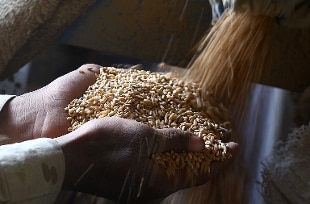Share
March 28, 2020 The coronavirus pandemic disrupts health and social balances, but also economic and consumer balance. A point on the situation is Coldiretti who discloses the data of an analysis of agricultural raw materials at the end of the week at the Chicago Bord of Trade (CBOT), the world reference point for agricultural raw materials.The data say that "the international price of wheat flies, which in the last week has recorded a further increase of 6% on the Chicago stock exchange with the Kremlin that has decided to limit exports after last week the prices of wheat in Russia had reached 13,270 rubles per ton, even surpassing that of Ural oil, which dropped to 12,850 rubles per ton. "
In contrast to the collapse recorded by the financial markets, "the race for essential goods is increasing the prices of agricultural raw materials, with the future contracts for the delivery of grain in May which - Coldiretti points out - have increased by about 6%, while soybeans have risen by about 2% and corn has increased by 0.7% over the past week. " According to experts, the demand for these products will continue to grow. The effects of the pandemic "therefore move from the financial markets to those of precious metals such as gold up to agricultural production whose availability has become strategic with the difficulties in transport and the closure of borders but also for the travel of citizens throughout the the world to hoard basic food items from the shelves of discount stores and supermarkets, "warns the agricultural association.
Then there is a concern, that of hoarding, "which - specifies Coldiretti - pushed Russia to retain part of its wheat production for internal use after becoming the largest exporter of wheat in the world while Kazakhstan, one of the largest sellers of wheat, has even banned exports of the product. "
The other cereals
These are choices that "demonstrate how governments are focusing on feeding their populations while the virus disrupts supply chains around the world with fears of a global food crisis".
The increase in wheat which is the most representative product of food in Western countries "is in fact only the tip of the iceberg with the tensions that are also recorded for rice with Vietnam which - reports Coldiretti - has temporarily suspended new contracts of exports while the prices in Thailand have risen to their highest levels since August 2013 ". Soybean , the agricultural product among the most cultivated in the world, is also on the rise, "with the United States contending with Brazil for the global record in crops and China which is the largest consumer in the world because it is forced to import it for use in food. of booming cattle with meat consumption ".
A tendency to hoarding also confirmed in Italy where in the last month of the health emergency "flour purchases practically doubled (+ 99.5%) but white rice rose by 47.3% and 41.9% those of semolina pasta, according to an analysis by Coldiretti on IRI data in the last 5 weeks to 22 March 2020 ".
Made in Italy
The increase in quotations on the Chicago stock exchange confirms that the global alarm caused by Coronavirus has revealed a greater awareness of the strategic value represented by food and the necessary guarantees of quality and safety ", says the president of Coldiretti Ettore Prandini. scenario of this type "Italy, which is the country with more controls and greater sustainability, will certainly benefit from it, but the trend of the past to underestimate the national agricultural potential must be reversed", continues Prandini. There are "the conditions to respond to consumer questions and to invest in national agriculture which is able to offer quality production by creating virtuous supply chain relationships with agreements that - specifies Prandini - enhance the supremacy of Made in Italy and guarantee the sustainability of production in Italy with long-term commitments and recognition of a fair purchase price, based on actual costs the sustained ". a fair price because "today in Italy farmers have to sell 5 kilos of soft wheat to be able to pay for a coffee and for this in the last decade - underlines Coldiretti - one in five wheat fields has disappeared with the loss of almost half a million hectares cultivated and disruptive effects on the economy, employment and the environment.

